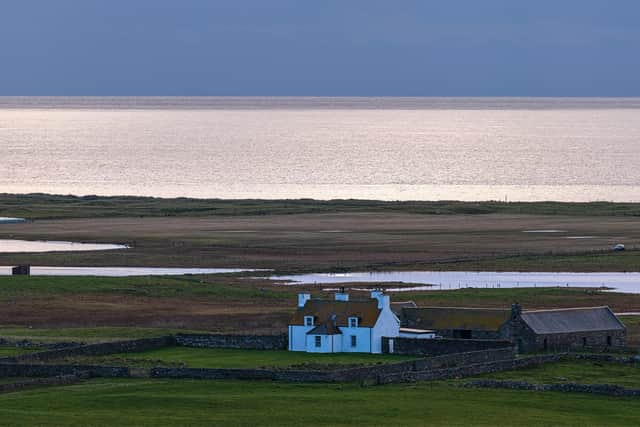Wood-burner ban: Crofters and remote communities face tougher lives as ‘centralised’ Scottish government ignores rural needs
Scottish ministers have been accused of ignoring the needs of rural communities as new rules banning wood-burning stoves and other ‘polluting’ heating systems in new-build homes come into force.
The Scottish Crofting Federation (SCF) hit out at the ban, says stoves can provide a lifeline source of warmth for off-grid properties during power cuts.
Advertisement
Hide AdAdvertisement
Hide AdThe organisation described the Scottish Government as “centralised”, with no care over the effects of its policies on people living in remote places – who are impacted most by the cost-of-living crisis, extreme conditions and lack of services.
It is calling for a rethink of the regulations, which it warns could have “a massive impact on the affordability and resilience” of any new homes being built in off-grid locations, including croft houses.
Crofters are “very concerned”, according to SCF chief executive Donna Smith.
“Large numbers of crofts are in areas where fuel costs and risk of power cuts are high but incomes are low, so there is a high proportion of people already living in fuel poverty,” she said.


“To impose this condition on new-build croft houses will exacerbate what are already challenging circumstances for many and we are really concerned that this may feed into existing problems, making provision of heating to new houses in these very rural locations extremely expensive.
“Clarification of exactly how this will impact those building in very rural areas is urgently needed.”
The SNP’s Kate Forbes echoed the concerns, describing wood-burners as “essential” for many.
Posting on social media site X, the Skye, Lochaber and Badenoch MSP said: “I see many replies dismissing legit concerns cos ‘everybody should have known about this already’ & it’s only for new builds. My inbox suggests most in rural Scotland disagree.
Advertisement
Hide AdAdvertisement
Hide Ad“Also new builds face [the] same power cuts, fuel poverty & local wood source that make woodburners essential.”
Heating homes and businesses accounts for a fifth of Scotland’s total climate emissions, and dramatic cuts are needed to hit the national net-zero by 2045 target.
The latest standards, valid for building warrants from April 1, state: “Every building must be designed and constructed in such a way that the means by which space within the building is heated or cooled and by which hot water is made available in the building is not by means of a direct emission heating system.”
This applies only to new buildings and conversions, and does not mean householders must take out wood burning stoves which are already installed.
There are exceptions for emergency heating, which allow ‘direct emission’ systems to be used in power cuts, for example.
Residents from the Isle of Eigg, which is run by the community and relies on a variety of power sources – largely renewables – described the ban as a “disaster” for locals.
“They are a key part of our net zero by 2030 strategy,” the group tweeted.
“Practical & cheap to fit compared to heat pumps etc. They provide hot water in winter when solar thermal can't. Island timber harvesting provides local affordable fuel & jobs.”
Advertisement
Hide AdAdvertisement
Hide AdThe Scottish Government has defended the regulations, which it says are important in helping tackle climate change and recieved “strong support” from the public in two consultations.
A spokesperson said: “The changes mean that new homes and buildings do not contribute to climate emissions, by banning the use of polluting heating systems such as oil and gas boilers and bioenergy – including wood-burning stoves.
“Existing homes are completely unaffected as the standard will not apply to the installation of heating in homes and buildings built before 2024.
“Wood-burning stoves and other heating systems that cause emissions can also still be installed in new homes to provide emergency heating, where a need can be justified – responding to feedback from rural communities.”
Comments
Want to join the conversation? Please or to comment on this article.